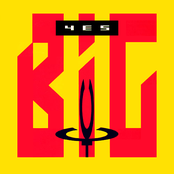Big Generator

Biography
Big Generator is the twelfth studio album by progressive rock band Yes. It was released in 1987 on Atlantic Records' Atco subsidiary label (Yes' last studio album for Atlantic) and was the follow-up to the massively successful 90125 album. A laborious album to make, Big Generator's sessions dragged on for two years, largely due to creative differences. Guitarist Trevor Rabin was aiming to progress beyond 90125, while founding lead vocalist Jon Anderson was beginning to yearn for more traditiona...
Big Generator is the twelfth studio album by progressive rock band Yes. It was released in 1987 on Atlantic Records' Atco subsidiary label (Yes' last studio album for Atlantic) and was the follow-up to the massively successful 90125 album. A laborious album to make, Big Generator's sessions dragged on for two years, largely due to creative differences. Guitarist Trevor Rabin was aiming to progress beyond 90125, while founding lead vocalist Jon Anderson was beginning to yearn for more traditional Yes music. The result was an album that was successful commercially, with two songs reaching the US Top 40: "Love Will Find a Way" (also a #1 on the Mainstream Rock chart) and "Rhythm of Love" (their last US Top 40 hit). The album was not as popular as 90125, and feeling that the band was going in a direction he didn't want to pursue, Jon Anderson began working on other projects at the conclusion of the Big Generator tour in 1988 including a partial reformation with his Yes bandmates from the 1970s. It is unclear if the album will ever be reissued by Rhino Records with additional bonus tracks as all previous Atlantic studio releases have been. While new additional material has not been available, unreleased demos may be pulled from the Warner vaults, or live material from 1988 used on the box set, Yesyears. Missing from the Yes "expanded and remastered" 2003/2004 series by Rhino/Warner, (like Yessongs, Yesshows and 9012Live), Big Generator was finally remastered (with inverted stereo image) and expanded in 2009 by Isao Kikuchi, the album was published by Warner Music Japan as part of their "Yes SHM-CD Papersleeve" series. Side one"Rhythm of Love" (Jon Anderson/Tony Kaye/Trevor Rabin/Chris Squire) – 4:47 "Big Generator" (Jon Anderson/Tony Kaye/Trevor Rabin/Chris Squire/Alan White) – 4:33 "Shoot High, Aim Low" (Jon Anderson/Tony Kaye/Trevor Rabin/Chris Squire/Alan White) – 7:01 "Almost Like Love" (Jon Anderson/Tony Kaye/Trevor Rabin/Chris Squire) – 4:58 Side two"Love Will Find a Way" (Trevor Rabin) – 4:50 "Final Eyes" (Jon Anderson/Tony Kaye/Trevor Rabin/Chris Squire) – 6:25 "I'm Running" (Jon Anderson/Tony Kaye/Trevor Rabin/Chris Squire/Alan White) – 7:37 "Holy Lamb (Song for Harmonic Convergence)" (Jon Anderson) – 3:19 2009 Japan Bonus Tracks [wpcr-13529]"Love Will Find a Way [Edited Version]" "Love Will Find a Way [Extended Version]" "Rhythm of Love [Dance to the Rhythm Mix]" "Rhythm of Love [Move to the Rhythm Mix]" "Rhythm of Love [the Rhythm of Dub]" Personnel[edit] YesJon Anderson - Lead & Backing Vocals Trevor Rabin - Lead & Backing Vocals, Acoustic & Electric Guitar, Keyboards Tony Kaye - Keyboards, Organ, Piano, Synthesizers Chris Squire - Bass, Backing Vocals Alan White - Drums, Percussion Additional personnelHorns On "Almost Like Love": Soul Lips-James Zavala, Lee R. Thornberg, Nick Lane, Greg Smith Harmonica On "Love Will Find A Way": James Zavala Keyboard Programming: Kim Bullard String Arrangements By Trevor Rabin ProductionProduced By Yes, Trevor Rabin, Trevor Horn & Paul De Villiers Mixed By Trevor Horn Engineers: Paul De Villiers & Alan Goldberg (Lark Recording Studios), Dave Meegan, Trevor Rabin, John Jacobs, Paul Massey, David Glover Assistant Engineers: Mike "Spike" Drake, Stuart Breed, Brian Soucy, Lois Oki, Julie Last, Jimmy Preziosi, Mike Kloster Mastered By Stephen Marcussen AccoladesBig Generator (Atco 790 522) reached #17 in the UK. It also reached #15 in the US during a chart stay of 30 weeks. [edit] Bootleg DemosA set of demos for Big Generator has been circulated unofficially. In some cases, the demos are scarcely different from the album versions, but the two demos of "Shoot High, Aim Low" demonstrate the labour of bringing the album to its final form, and thus are of interest to students of the creative process or Yes history. The first demo is an early, sparse mix with Anderson singing what would become Rabin's parts. The minimal feel lacks the intricate production of 90125, but it may simply have been an early mix. The second seems to be re-recorded, or at least re-mixed, with the drums pushed up front and a decidedly different feel, climaxing in a Jon Anderson spiritual peak that harks back to the 1970s Yes. The final song on the album is a combination of both versions, with a significantly more lush production approaching that of 90125. (Both demos have different lyrics from the final version. Some notable changes are "Malibu sand" for "crimson sand" and "first ride" for "last ride". The second demo makes the "blue fields" connection more explicit by mentioning Central America.) Vinyl versionThe vinyl record cover art is almost identical to that of the CD, but on different colouring: yellow is replaced by cyan and red by purple. The word YES is in the upper part of the letter G, and the symbol is of red colour and is located on the lower part of the letter G. Charts[edit] AlbumAlbum - Billboard (North America) Year Chart Position 1987 The Billboard 200 15 SinglesSingles - Billboard (North America) Year Single Chart Position 1987 "Love Will Find a Way" Mainstream Rock Tracks 1 1987 "Love Will Find a Way" The Billboard Hot 100 30 1987 "Rhythm of Love" Mainstream Rock Tracks 2 1987 "Rhythm of Love" The Billboard Hot 100 40 1987 "Shoot High Aim Low" Mainstream Rock Tracks 11 1988 "Final Eyes" Mainstream Rock Tracks 20 Read more on Last.fm. User-contributed text is available under the Creative Commons By-SA License; additional terms may apply.

